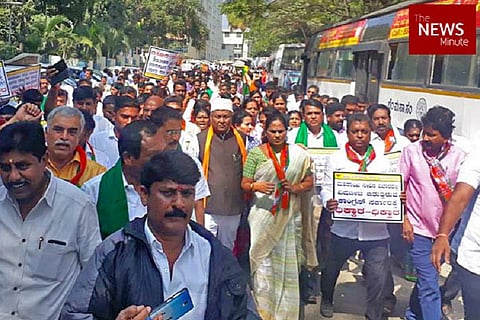

The Mahadayi River issue has flared up, and protests continue to take place across Karnataka. As the row intensifies, we look back at the root of the problem.
Farmers held protests across Karnataka on Wednesday, and expressed their disappointment that the issue is being politicised. They demanded that the leaders should support their cause. Protests erupted in Bengaluru and in several districts of North Karnataka including Dharwad, Gadag, Hubballi and Bagalkote.
Why are the protests taking place?
The Mahadayi issue has been going on for over 30 years and seeks to address the water problems in North Karnataka.
The Mahadayi River, also called Mandovi in Goa, is essentially a rain-fed river that is shared between Karnataka and Goa for their water needs.
The river flows 35 km through Karnataka and then 52 km through Goa, before flowing into the Arabian Sea.
The Mahadayi catchment area includes some parts of Maharashtra as well. Goa constitutes a large part of the river’s catchment, which also includes runoff from Maharashtra, although the main stem of the river does not flow through that state.
The regions of northern Karnataka, along with the bordering areas of Maharashtra and Goa, have been depending on the Mahadayi River basin for water needs – including drinking water and irrigation.
To bring water to the drought-prone regions, the Kalasa-Banduri Nala project was conceived, which aimed to divert 7.56 TMC of water from River Mahadayi to the Malaprabha River in Karnataka. This would be done by building canals across Kalasa and Banduri, two tributaries of the Mahadayi river. The project aimed at improving drinking water supply to Hubballi-Dharwad cities and also to Belagavi and Gadag districts in North Karnataka.
How did this project come about?
In 1980, farmers at Navalgund in Dharwad district and Nargund in Gadag district launched a movement against the Karnataka government, demanding drinking water supply. The reason for the agitation was because the state government had collected a betterment levy, but had not provided water. The then Karnataka Chief Minister, Gundu Rao, appointed a committee headed by the opposition leader S R Bommai.
The SR Bommai Committee recommended the linking of Mahadayi river to the Malaprabha river.
However, nothing happened until 1989, when SR Bommai became the Chief Minister of Karnataka. He signed an MoU with the Goa government, to construct a dam near Kalasa, Karnataka. This, too, did not take off as the Bommai government fell in a matter of months.
The original plan was to divert water from the Mahadayi river and feed the Malaprabha river and store the water in Navilatirtha dam in Dharwad district.
This Kalasa-Banduri Nala project was then taken up by the SM Krishna government in Karnataka in 2002.
In 2002, the Goa government, headed by Manohar Parrikar, approached the Centre and requested the setting-up of a Mahadayi Water Dispute Tribunal to assess the situation and grant allocation of water to the three states – Goa, Karnataka and Maharashtra. The Goa government argued that the project would cause ecological damage to the state. The clearance for the project was then put on the back-burner by the NDA at the Centre.
When the SM Krishna-led Congress government could not accomplish the task in 2006, the BJP-JD(S) coalition government decided to begin the construction in Belagavi. Goa took up the matter with the Supreme Court for the creation of a tribunal.
It was in 2010 that the UPA government set up the Mahadayi Water Disputes Tribunal. Karnataka sought the tribunal’s go-ahead for the constitution of the Kalasa-Banduri project, arguing that the river must be used for drinking purposes instead of letting it out into the sea.
Present situation
On July 28, 2016, the Mahadayi Water Disputes Tribunal rejected Karnataka’s demand to divert 7.56 TMC of water from the Mahadayi river basin to the Malaprabha river. Following the order, protests erupted in the region.
In North Karnataka, protests have come up and died down at intermittent periods of time. In July this year, the farmers of Navalgund and Nargund areas held a silent protest for almost a week. In 2016, farmers agitated for almost 300 days in the same areas.
Although Karnataka has seen all three major political parties in power – Congress, BJP and JD(S) – in various combinations, the project has been reduced to little more than a means to obtain political mileage and as a metaphorical stick to beat the ruling party with.
With the Karnataka Assembly Election due in 2018, BJP's State President Yeddyurappa had promised in November that he would get a written agreement resolving the water dispute by December 15. That promise, however, was not fulfilled. Instead, BJP National President Amit Shah prevailed upon Goa CM Manohar Parrikar to consider releasing the water on humanitarian grounds and boost the party's poll prospects in the state. A team of BJP leaders, led by Karnataka Chief BS Yeddyurappa had met Parrikar and Amit Shah in Delhi on December 20.
Following the meeting, Yeddyurappa released a letter written by Parrikar, which stated that the Goa government is willing to hold talks regarding the Mahadayi water sharing dispute.
While the Karnataka government was angered by the release of the letter, pointing out that the Goa CM had addressed Yeddyurappa instead of Siddaramaiah, the Karnataka CM welcomed any attempt to resolve the issue. Siddaramaiah said that he was willing to participate in talks if Prime Minister Narendra Modi calls a meeting of Chief Ministers of Maharashtra, Goa and Karnataka.
This, however, was not enough to appease farmers groups, who accused the BJP and the Congress of playing politics at their expense. Issuing a “warning” to the Central and state governments, farmers groups approached the Karnataka Chief Electoral Officer and urged him not to hold Assembly Polls until the Mahadayi dispute was resolved.